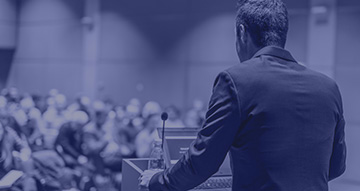Sports and Sportsmanship: Lessons for All Pitches
By Viren Rasquinha, Managing Director and CEO, Olympic Gold Quest |Nov 01, 2021
Sports is the best reality show ever, teaching us lessons that go beyond the classroom. Viren Rasquinha, Olympic Gold Quest, tells us what these are.
Sports and Sportsmanship: Lessons for All Pitches
Viren Rasquinha, Managing Director and CEO, Olympic Gold Quest
Indian hockey players—men and women—performed remarkably at the recently concluded Olympic Games. While players put in years of toil to dribble their best, simultaneous and perhaps greater efforts are required from the entire ecosystem that makes up a sport. Listen to Viren Rasquinha, the former captain of the Indian National Hockey team, and Managing Director and CEO, Olympic Gold Quest, talk about all this and more in this podcast.
TRANSCRIPT
Shruti Singhal: 0.04
Indian hockey players won a billion hearts at the recently concluded Olympic Games in Tokyo. While the men’s team ended the 41-year hiatus in the medal tally by bringing home a bronze, the women’s team was an inspiration to all, despite finishing fourth. The message is clear—Indian hockey has arrived on the global field.
We’ll be hearing from former captain Viren Rasquinha about how hockey and everything around it has changed and grown since he retired in 2008.
Thanks so much for joining us today, Viren.
Viren Rasquinha: 0.44
Absolutely.
Shruti Singhal: 0.45
I’d like to begin by asking you.. As a former Olympian, MBA graduate and businessman, could you talk about what it takes to be a professional sportsperson. How did your MBA experience inform your work at Olympic Gold Quest?
Viren Rasquinha: 01.02
Number one: You [have] got to have the talent in that particular sport. Without that, it’s hard to play hockey for example, at the highest level of sport. But just talent is not enough, and I think just years of effort, honing your skills, being deeply focussed, and [being] almost obsessive in your pursuit of excellence. It takes a lot out of you, and there are many ups and downs along the way; and for me, hockey taught me so much; one of the biggest things that [it] taught me is actually how to come back from defeat because in sport you lose so much, and for me, that was one of the biggest lessons.
And honestly, that’s why I even thought that the one year at ISB, which is otherwise an extremely rigorous course, was actually a breeze, because I was used to being under pressure all the time and dealing with so many issues. So, that helped me with my time at ISB.
Shruti Singhal: 1.59
It’s really true that sports prepares one for everything in life. How do you think the ecosystem around sports in general, and hockey in particular, changed since you were a player?
Viren Rasquinha: 02.12
I think hockey has changed a lot over the last decade and a half since the time I quit sport. The game has gotten faster, much more physical, [and] stronger. You know, simple things like rolling substitutions have changed so much. There were rolling substitutions in my time, but maybe at that point of time in a 70-minute match, teams would make an average of ten substitutions. Right now, at the Olympics at Tokyo, a month back, Australia was making more than 100 changes on average per match in a 60-minute match. So, you can imagine how the pace of the match has changed because fresh players are coming on to the pitch virtually every minute; which means the way in which you train, the way in which you plan for international matches [changes] and just the emphasis on sheer physical fitness.
I think athletes also need to get smarter because as the game gets faster, things happen quicker on the ground. You need to be intelligent enough to take split-second decisions [about] when to pass, when to dribble, when to take a shot at the goal, when to defend; everything happens in split seconds, and I think hockey players need to be extremely intelligent and composed to be able to deal with the pressures of international hockey. So, I think every sport has changed by leaps and bounds.
As far as India goes, the one big change I’ve seen over the last decade is just self-belief in our young kids; and that self-belief is born out of having really good role models who have achieved so much and have paved the way. So, athletes like Mary Kom, P. V. Sindhu, Saina Nehwal, Mirabai Chanu, Ravi Kumar Dahiya, now in wrestling. They’re enabling the young kids coming from the villages and small towns to believe that they can also achieve at the highest level of international sport.
And, also, I think the level of training has been much better, be it the Government Sports Authority of India, national sports federations, or private organisations like Olympic Gold Quest, of which I’m a part.
I think the gaps in training are now becoming fewer, and because of that quality preparation [has improved], it’s giving a lot of self-confidence and self-belief to our athletes. That’s the one big change that I’ve seen over the last decade.
Shruti Singhal: 04.34
That’s very encouraging! Could you talk about the resources that go into promoting sports as everyone eyes more Olympic medals? How can coaches/associations/families ensure that players get all that they need?
Viren Rasquinha: 04.49
In the last five years, especially in this whole Tokyo Olympic cycle, the support to athletes has been excellent. Be it coaches, training facilities, training during COVID-19 times, the healthcare for them, the support team in terms of physios, trainers, nutritionists, mental trainers; I think this has really improved in the last decade, but more so in the last five years. But there’s always scope for improvement, and we need to get better on all fronts.
And I think the best part of the Tokyo Olympic cycle was the teamwork between various stakeholders like the Government Sports Authority of India, national sports federations, and private organisations like Olympic Gold Quest.
Shruti Singhal: 05.30
Fair enough. On those lines, what avenues do you think can be leveraged for scouting and training the right talent at the right age, especially with changing times?
Viren Rasquinha: 05.42
The junior programmes across sports need to be improved a lot. Of all the ingredients that go into the mix of building Olympic champions, the coach is the most important ingredient. We have to train really good quality Indian coaches across sports, across the board, because if we don’t have the right coaches at the right age, teaching our talented kids the right basics, the right technical skills, it will be too late by the time they become 18, 19, or 20 and reach the Indian team. At that point of time, they will have to unlearn everything they have learned in the past, and by that time, it’ll be too late. So, coaches are a very important issue at the grassroots level, at the domestic level. So, we need to upgrade the skill of coaches. We need to ensure that there are strong domestic programmes [and] strong domestic competitions.
Take for example, we all saw the Indian women’s hockey team doing so well at the Tokyo Olympics. For me, it was one of the stories of the Tokyo Olympics. But I still feel that there is scope to have far more domestic competitions for women’s hockey across the country. Unless athletes have regular competitions, there’s very little motivation to train, so that is something that is very critical.
So, coaches, junior programmes, developing domestic competitions—these are, I would say, the three priorities for developing sport in the country. And I’m talking [about] every sport; there are 65 recognised sports by the government of India, by the Sports Authority of India, which are funded by the government. So, if we have strong junior and domestic programmes, and strong coaches across the country in these programmes; coaches are the most important in recognising young talent. I was very lucky to be taught when I was 11 years old. My school coach was a hockey Olympian himself. His name was Marcellus Gomes; he played in the 1984 Los Angeles Olympics. So, if it was not for him, there was no way I would have gone on to play for India.
So, if you have the right coach, the right person teaching you at the right age, it makes a huge difference.
Shruti Singhal: 07.50
I like how you’ve put it as a three-pronged approach to enhance sport and empower sportspersons. Once hailed as bigger than cricket, hockey as a sport seems to have lost its shine over the years. Keeping India’s performance in the Tokyo Olympics as the backdrop, what were your key takeaways? Are we there yet, and if yes, why did it take us so long to resume our place on the global stage?
Viren Rasquinha: 08.17
Success is one of the most important parameters for defining how popular a sport is, and the fact of the matter is that cricket has been extremely successful over the last 30 years. Hockey hasn’t. Until and unless we start winning, it’s going to be hard for a sport to become popular. No one wants to support a sport that does not qualify for the Olympics or comes last. And that was what happened to us in 2008. We did not qualify for the Olympics in hockey for the first time ever. [In] 2012 we qualified, [but] we finished 12th out of 12 teams.
But I think on the positive side, since that dark period of 2008 to 2012, we have climbed that ladder one step at a time, and today, we are in the top three in the world. So, I think Hockey India has done really well. There has been a long-term plan and you climb the ladder one step at a time. You can’t climb right from the bottom to right to the top immediately, so we [have] got to be patient, and we cannot be complacent. It was an amazing performance at Tokyo to win a medal after 41 years at the Olympics. We should take lessons from cricket and how they have marketed the sport, [and] how they have built heroes and role models.
But, like I said, we need to win consistently. And winning just does not just happen, you don’t just turn up and win. You [have] got to plan and prepare and execute; and the Indian team has done really well at Tokyo; especially the women’s team, and they need to build on this. And I think we can look forward to a very exciting decade for Indian hockey. I hope they can build on it and not just success on the pitch but success off the pitch, and commercially making it a very viable sport.
Shruti Singhal: 09.57
Consistency is key, true. Could you comment on the increasing viewership for the Olympics (or any other global tournaments)? What has changed for India to contribute to this response? Is there scope for more?
Viren Rasquinha: 10.12
Today, India’s not just winning more medals at big events like the Olympics. I think we, as a nation, are not satisfied with just Commonwealth Games medals, Asian Games medals, but we’re targetting Olympic medals. And not just winning more medals, there are many more athletes genuinely challenging for medals. The pool of athletes that are challenging from medals is much more. That’s making it exciting for the viewer, and let’s face it, sport is the best reality show ever. It’s the most unscripted show, [and] the most unpredictable sort of event that you can have; so, sport is amazing. And if India does well, just given the sheer numbers that we have, many more people will watch sport.
Shruti Singhal: 10.52
True. Creditable as Tokyo was, how can Indian players do even better at the 2024 Paris Olympics? What is your advice to those in authority to ensure this? In other words, will India ever be what China (or the US) is in sports?
Viren Rasquinha: 11.12
Paris preparation started three years back, so, I think, the core group of the athletes preparing for Paris has already been identified a long time back. Training is already in full swing, and India is on the right track. We just need to keep [doing] what we are doing. We need to ensure that, at every stage, merit is the only criteria that we decide to promote young athletes going forward. We need to ensure that they stay motivated.
And support systems need to be very strong. We need to ensure that the coaching and non-coaching staff working with the team constantly upgrade their skills. You know it may be a Sindhu as an individual stepping on the badminton court, but there is an army of people working behind the scenes who are equally important. So, we need to ensure that the entire army is well-trained and well-motivated, as we challenge for and prepare for Paris ‘24.
Shruti Singhal: 12.11
Right, we need to acknowledge and empower all those who work silently behind the scenes.
Do you think mass media and films like Chak de! India helped popularise hockey and put it on a pedestal? What more do you think popular culture can do to highlight marginalised sports and perhaps increase their commercial value?
Viren Rasquinha: 12.33
So Chak de! was a great movie. It made hockey popular, but it doesn’t help hockey on the pitch. Chak de! released in 2007, and in 2008, India didn’t qualify for the Olympics for the first time in their history. So, for me, all this doesn’t matter; that’s not my area of expertise; I’m sure there are a hundred other people to answer this question. I deal with what happens on the pitch, not off the pitch.
Shruti Singhal: 12.55
Right, fair enough. You’ve talked about the role of fitness in the performance of Indian players at the Olympics in Tokyo. What does fitness mean to you and how important do you think it is for non-athletes to be fit?
Viren Rasquinha: 13.10
Fitness is critical, not just for athletes, but for everyone. And you know, especially with the pandemic, we’re seeing that just looking after our personal health is so important, and if we are fitter, then we are automatically healthier. And a healthier nation is a far stronger nation. Everyone does not need to be a professional athlete or a Mary Kom or a Sindhu. But everyone can definitely go for a walk or a jog or play a non-contact sport; but we need to play, and we need to encourage our kids to play. And I think sport needs to be a much more integral part of our school curriculum and education.
Sport has taught me so many lessons in life that possibly the classroom can never teach you. So, sport has to be a bigger part of everyone’s life. And we have to stop being a nation that only watches sport; we need to be a nation that also plays much more sport.
I remember when I was 11 years old. My school hockey practice used to start at 6:30 in the morning and I would go on cycle from home to my school. And one day, I landed up at 6:35 for training and my coach did not allow me to enter the training pitch that day. Since that time, I have never ever been late for a meeting; even if you saw in today’s meeting, I was two minutes before time. I think the simple lessons of discipline, of commitment, of teamwork, of resilience, of having a never-say-die attitude [and] of being able to come back from defeat—these are all critical lessons that sport teaches you. And like I said, it’s hard to learn those lessons in the classroom.
Shruti Singhal: 15.00
True. These are such important values, almost like life skills, that so many of us continue to read books on and take courses about time management and personal improvement much into adulthood and long into our careers. So many people struggle with these things, and it’s so beautiful that sports drills all this into players at an early age.
Viren Rasquinha: 15.23
Absolutely.
Shruti Singhal: 15.25
You’ve talked about how the system around sports has improved in the last few years. Another thing is the openness and positivity in the discussions around mental health. Quite a few renowned athletes did not go on to compete this time to take care of their mental health. What is your opinion about this?
Viren Rasquinha: 15.45
Mental health issues were always there. But it’s just that now it is more accepted to speak out. I think back in the day, if you look at even ten years back, people were very reluctant to come out with that they had mental health issues. I’m very happy to see that over the last decade, attitudes towards mental health are changing a lot. And yes, of course it’s very prevalent in sport, like in all other sectors; and sportspersons, I think, go through a lot of stress, a lot of issues where they’re insecure, you know, you’re not sure of your place in the team. It’s hard to take defeat. It’s hard to accept it when you’re injured, and you can’t play. The shelf life of athletes is very short, so, of course we need trained sports psychologists. That’s first and foremost.
I think athletes must understand that they need to want to work with mental health trainers. They need to accept the fact that there are trained professionals who can help them.
Also, I think, overall, attitudes need to change even more. It has been better over the last ten years, but you know we should not look at it as a negative aspect if an athlete wants to speak to a sports psychologist. I think it’s still partially looked at that way, and in that matter, we really need to change attitudes towards that. But yeah, to summarise, trained sports psychologists, acceptance that it is okay to not be okay, and also changing [our] attitudes. These are all important aspects in dealing with mental health issues.
Shruti Singhal: 17.28
True. We need to normalise speaking up, and making it okay to not be okay. Having said that, we need constant reminders that professional sportspersons make so many sacrifices to pursue a sport before they reach the national and international stage. But once they win a medal or set a new record, their victory becomes a matter of national pride. Do you think this part of a sportsperson’s fame is hypocritical? Especially in the case of players from the north-east, who are only “daughters/sons of India” when they bring back a medal.
Viren Rasquinha: 18.05
I think the north-east is a treasure trove of talent, especially sports talent. It is a gold mine for India, and it’s been really untapped, and honestly, we, as a nation, have failed the north-east. We have been extremely unfair to people from the north-east. We, at OGQ (Olympic Gold Quest), have worked with several athletes from the north-east and they’ve just been amazingly talented athletes, and I would say even more amazing as individuals right from Mary Kom to Mirabai Chanu to Lovlina Borgohain. And, like I said, there’s incredible talent. It’s just been unfair to them over the years. We need to do far more; India, as a nation, needs to be doing far more to support the north-east.
Shruti Singhal: 18.53
Thanks so much for this insightful conversation.
Viren Rasquinha: 18.57
Absolutely.
Shruti Singhal: 18.58
We all hail hockey as the national sport and take pride in the victory of our players. But my takeaway from this conversation is that our duty lies beyond watching and cheering. As Viren says, sports is the biggest non-scripted reality show. And as a nation of more than 1.3 billion people, we need to play and promote sports among our youth and each other, and in doing so, we might just set ourselves up for success.
Thanks for tuning in. Take care and stay safe!

Viren Rasquinha, Managing Director and CEO, Olympic Gold Quest



